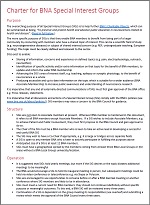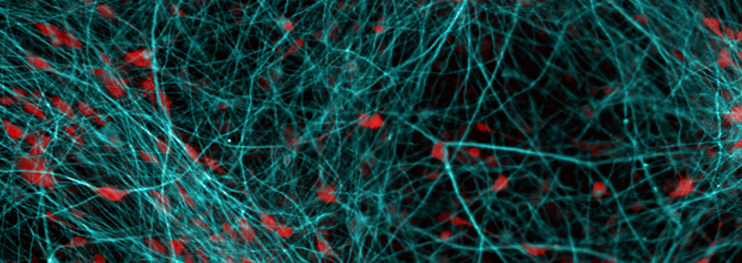Click on the links, left (or above if on a mobile device) to read about specific SIGs.
Purpose and Charter
 The purpose of BNA Special Interest Groups (SIGs) is to enable our members to benefit from being part of a larger community by connecting with others, across geographical areas, with a shared interest. This can be in a scientific field of study (e.g. neurodegenerative disease) or subject of shared interest/concern (e.g. REF, undergraduate teaching, European funding).
The purpose of BNA Special Interest Groups (SIGs) is to enable our members to benefit from being part of a larger community by connecting with others, across geographical areas, with a shared interest. This can be in a scientific field of study (e.g. neurodegenerative disease) or subject of shared interest/concern (e.g. REF, undergraduate teaching, European funding).
The broader role of SIGs - as with all BNA activities - is to further our charitable objects, which can be summarised as "To preserve and protect health and advance public education in neurosciences related to health and disease".
To read more about SIGs, please see below and download the BNA SIG Charter.
Back to top
Activities
A SIG's activities include but are not limited to:
- Sharing of information, concerns and experience on defined topics (e.g. pain, electrophysiology, outreach, neuroethics)
- Identification of specific activity and/or extra information on that topic for the benefit of BNA members, to update and inform the wider BNA membership
- Advancing the SIG’s area of interest itself, e.g. teaching, epilepsy or synaptic physiology, to the benefit of neuroscience as a whole
- Producing accessible and up to date information on the topic which is suitable for a wider audience (BNA Associate Membership) to increase public awareness and understanding of neuroscience research
Back to top
Structure
- The Chair of a SIG must be a BNA member who is keen to take an active lead in developing a successful and useful BNA SIG
- A SIG should consist of at least 12 BNA members
- SIGs must have a geographical spread by the members coming from at least three BNA local groups or (for areas without local groups) university/location.
- SIGs are not currently open to Associate members
Back to top
Responsibilities
- Chair must complete and submit the SIG application form to the BNA council
- Each SIG meeting must be minuted and these made available to the BNA council and membership
- Create a brief report to be circulated to a wider membership at least yearly
- SIG must produce a brief summary of its area of interest for Associated members and the wider public
- Must maintain its webpage on the BNA website
Back to top
Support
The BNA will support SIGs in these ways:
- To help identify and set up groups
- Help arrange first meeting of a new SIG
- Meetings should ideally be hosted by a member institution, but the BNA can offer up to £500 to support the initial activities of the SIG.
- The SIG can apply for further funding of up to £500 once every three years (i.e. in years 1, 4, 7, 10..) contingent on successful outcomes and review of the SIG’s activities
- The BNA sets up and hosts a webpage on the BNA website for SIG members’ use (the contents of which is then maintained by SIG members)
- Communications and co-ordination of groups
- Ensures minutes and outcomes of SIGs are disseminated to all members
Back to top
Application procedure
Interested in forming a SIG?
First of all, please read the SIG Charter in full, and contact us if you have any questions about initiating a BNA SIG. We can help you identify potential members in different locations through the BNA member network.
Secondly, please download the SIG application form.
Completed SIG applications can be submitted at any time. Please send to office@bna.org.uk
Back to top
Enquiries
The Council member with responsbility for SIGs is Ros Langston. Please contact her to discuss SIGs at r.f.langston@dundee.ac.uk.
If you have questions about the application procedure, please contact the office.
Back to top

 The purpose of BNA Special Interest Groups (SIGs) is to enable our members to benefit from being part of a larger community by connecting with others, across geographical areas, with a shared interest. This can be in a scientific field of study (e.g. neurodegenerative disease) or subject of shared interest/concern (e.g. REF, undergraduate teaching, European funding).
The purpose of BNA Special Interest Groups (SIGs) is to enable our members to benefit from being part of a larger community by connecting with others, across geographical areas, with a shared interest. This can be in a scientific field of study (e.g. neurodegenerative disease) or subject of shared interest/concern (e.g. REF, undergraduate teaching, European funding).